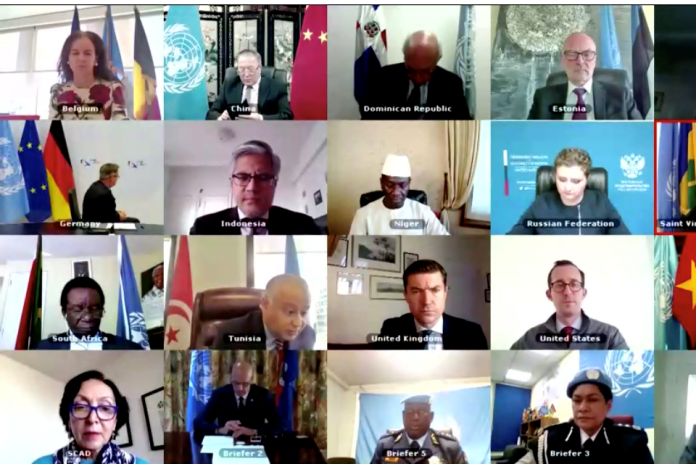Many thanks indeed, Madam President, and thank you also to all of our excellent briefers today for their thoughts and for sharing in particular their perspectives from the ground.
This is an issue that’s of real interest to me. It was actually the first thing that I ever worked on in our foreign service, international policing and particularly UN policing, and I’ve seen just how effective UN policing can be from the Balkans to Sierra Leone, so it’s very good to have this discussion today.
I also want to start by offering our thanks through you, our police commissioners, to the women and men in UN Police components around the world who work on our behalf to protect and serve vulnerable communities. In this sixtieth anniversary year of the creation of UN Police, we are reminded again of their enormous dedication, professionalism and courage as they continue their work against the challenging backdrop of the Covid-19 pandemic.
Now, Madam President, UN policing is a fundamental part of peacekeeping, as we’ve heard again and again today. Police play a central role in helping to establish a protective environment for civilians in restoring security and justice, and critically in re-establishing the rule of law in conflict affected areas. We owe it both to officers deployed in the field and the people they serve to continue to enhance the effectiveness of UN policing through practical reform. The UK was a strong supporter of the 2016 external review of the UN Police Division, and we note that a number of those recommendations from the review remain outstanding.
But today, Madam President, I would like to highlight three important areas that we need to get right in order to ensure that UN policing can remain effective. A sustained focus on these issues will be critical to achieve the vision set out in the Secretary-General’s Action for Peacekeeping agenda.
The first of these is that policing must be fully integrated into mission planning processes throughout the life of a mission, from inception to transition. Police experts need to be at the table and to be supported by relevant intelligence, reporting and data. Missions must be able to undertake continuous assessment in order to ensure that policing activity remains appropriate to the needs on the ground. So we have just got to keep thinking about that.
Second is about pledges of personnel. These need to be tailored to the needs of the mission and to contribute to achieving the Secretary-General’s Gender Parity Strategy. Recruitment needs to be fair, timely and merit-based, selecting the right skills, capabilities and expertise that particular missions need. We welcome the use of tools such as the Peacekeeping Capability Readiness System to help identify capability gaps and to seek pledges to fill them. The full, equal and meaningful participation of women in UN policing is not only a moral imperative, but a critical operational consideration too. Trust between UNPOL components and local communities can be more readily established if police reflect those they are serving.
And our third point is that police performance must be prioritised. When personnel perform to the high standards we all expect, they are better able to deliver their mandates and ensure their own safety and security. We look forward to the implementation of the Peacekeeping Performance and Accountability Framework in respect of police, but we also stress the urgent need for the finalisation of the policing Strategic Guidance Framework. This guidance then needs to be operationalised, leading to the development of the right manuals and training tools to allow police contributors to understand what standards their personnel need to meet.
Now, I’m glad we’re having an interactive session because I’d like to turn to a few questions, if I may, and the first is for Assistant-Secretary-General Zouev. It is expected, ASG, that demands on the UN Police Division will continue to grow, spanning both police operations and non-mission settings in the coming period. It would be very good to hear from you what priorities and extra resources the Department of Peace Operations is providing for the Division. Is there enough capacity to undertake the necessary planning for police deployments, including in relation to transitions? And if I may just come back as well to the Strategic Guidance Framework, it would be very good to have an update on the status of this framework and to know when we can expect this to be finalised and published.
Then if I may, Madam President, a couple of questions for our excellent briefers. The first goes to the UNMISS Police Commissioner, Ms Vuniwaqa. I would be very interested to understand what reflections on the process of capacity building Commissioner Vuniwaqa has when it comes to South Sudan’s National Police Service. In particular, how is UNMISS determining when and what kind of policing responsibilities should be shared with the SSNPS? So how do we get that balance right of transitioning or passing over responsibilities?
And the second question was to the MINUSMA Police Commissioner, Mr. Yacouba. Recent developments with the Malian security forces, and your coordination with them, has probably changed in the current environment – in other words, after the coup. I wonder if you could tell us how MINUSMA is managing any challenges in relation to that? As things stand, do you feel you have the right resources to plan and conduct supporting activities when it comes to embedding the rule of law?
Thank you very much and a very good day to all of you.







